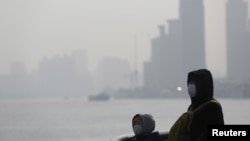Air quality in China's smog-hit northern regions, which include the capital Beijing, worsened in October despite overall improvements over the course of the year, the environment ministry said in a notice late on Monday.
The Ministry of Environmental Protection said concentrations of small breathable particles known as PM2.5, a key smog indicator, fell 12.5 percent to an average of 42 micrograms per cubic meter from January to October. World Health Organization guidelines recommend an annual average of 10 micrograms.
But in October alone, smog concentrations in the Beijing-Tianjin-Hebei region, a front line in China's war on pollution, were worse than the same period last year, the ministry said.
The ministry said six of the worst performing cities over the first 10 months were located in the industrial province of Hebei, which surrounds Beijing. Xian, the location of China's famous Terracotta Army, also appeared in the top 10 smoggiest cities over the period.
Smog normally worsens in winter as China's largely coal-fired urban heating systems are activated in northern regions, but the ministry has warned that the situation could be more challenging this year as a result of unfavorable weather conditions.
During several recent smog build-ups, the ministry dispatched inspection teams to establish whether emergency smog alert systems in Beijing and Hebei were being implemented correctly. It found that local governments were not cracking down hard enough on firms that broke rules.
The alert systems allow authorities to limit traffic, suspend construction activities and force firms to cut production during heavy smog.
China's capital Beijing has closed down dozens of industrial enterprises, shut down coal-fired power plants and replaced coal heating with natural gas in a bid to tackle smog. Cities in Hebei have also been under the pressure to cut coal consumption and impose tougher punishments on firms that exceed emission limits.
Environment group Greenpeace said in a research report published on Monday that Beijing's efforts to cut coal burning has led to a 90.4 percent decline in arsenic concentration levels since 2013, meaning that the city now meets national standards.





